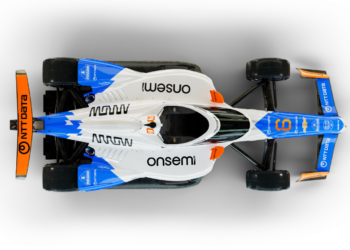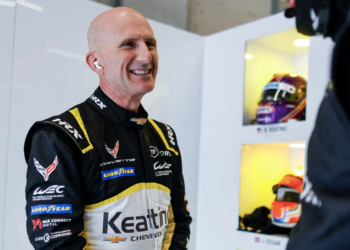The 2019 Canadian Grand Prix had one driver winning, the other victorious, but neither truly emerged triumphant, on a day in which Formula 1 fell into a hole that sparked general discontentment, as Motorsport Week analyses.
The Canadian Grand Prix should have been remembered for an epic tussle between two of the sport’s greatest champions, representing iconic manufacturers, in front of a passionate fanbase on a gloriously hot and sunny day on the picture-perfect Ile Notre Dame. It should have been remembered for a tense race in which Ferrari finally kick-started its 2019 season, with Sebastian Vettel returning to the top step of the podium for the first time since last August. But instead the discussion has been on penalties, fine margins, the black and whites that are in reality 50 shades of grey, and of a sport struggling with its current identity while trying to shape its future.
The incident in itself was almost a snapshot of the last two years. Given Mercedes’ dominant start to the 2019 Formula 1 season and Ferrari’s difficulties with its SF90, particularly through the slow-speed corners and in tyre warm-up, the Mercedes/Ferrari battle had yet to truly spark into life. Heading over to Canada there were expectations that the high-speed nature of the Circuit Gilles Villeneuve would play to the strengths of the SF90, ie, the advantage it holds in a straight line. The timesheets reflected such a trend, with Mercedes’ W10 quicker through the first two sectors and Ferrari’s SF90 on top in the final sector of the lap.
.jpg)
Vettel’s pole position was reminiscent of the Vettel of old, a lap from a driver who has skulked and erred his way through much of the last year as one title bid collapsed and another failed to kick into life. It was a shot in the arm for Vettel, Ferrari and Formula 1, even if the pure results have made Mercedes’ dominance more pronounced than the reality of the pace divide. It was Red Bull-era esque from Vettel early on as he opened a two-second advantage, preserving it through the first stint, with Hamilton’s later stop leaving him four seconds adrift. That gap soon reduced. On lap 34 of 70 a 3.7s deficit was reduced to 3.0, then 2.9, 2.4, 1.9, 1.5, 0.7. Hammer Time well and truly enacted. Hamilton was nonetheless not error free. A couple of lock-ups into the hairpin, where he was able to run deep, occasionally thwarted his efforts, while the positioning of lapped traffic also meant the gap began to ebb and flow. On lap 45 a radio message to Vettel hinted of problems, as race engineer Ricardo Adami informed him “the numbers on the steering wheel are correct, take actions,” thought to refer to fuel consumption, an element which Ferrari is still struggling, according to rumours. “Where is he quicker than me,” Hamilton asked Mercedes. “Turns 1, 2 and 8” came the reply.
The defining moment came on lap 48. Everyone has watched the video. Vettel got a snap of oversteer as he chased the lapped Toro Rosso of Daniil Kvyat, ran wide across the grass while making frantic corrections to save the car, re-joined, and did so with Hamilton in close pursuit, thus wrenching open a can of worms.
It took approximately 10 laps for a decision to be reached between the four-man stewarding panel and the penalty was a five-second sanction for Vettel. The justification was that Vettel had re-joined the track in an unsafe manner and forced Hamilton to take evasive action. This is where Formula 1 has backed itself into a corner. If it has been judged by the available footage that Vettel did indeed transgress against the regulations then the stewards have no choice but to issue a penalty, of which a five-second time drop is the most lenient. They cannot judge Vettel to be guilty and not issue a penalty. It was also suggested that upon re-joining they felt Vettel continued to move across the track, with a cursory glance in the mirrors a hint that he knew where Hamilton was – though Vettel himself insists that was not the case. The decision of the stewards is bound by regulation. The emotional approach is that this was a race taking place between two greats and that such regulation has led to an unnecessarily complex situation that means every small incident has to be scrutinised. Where do you draw the line? There is the regulatory factor and the entertainment factor. There is the clamour for consistency – note the penalty dished out to Max Verstappen in Japan last year – but also the desire for races to be decided on track and not in an office, while even very similar incidents have different nuances. Every major sport has a penalty system to combat incidents of pure cheating or outrageous actions, but the inflexibility means it leaves itself open to being hoisted by its own petard.
.jpg)
“I just feel that nowadays we look at so many things that maybe we didn’t look at in the past because nobody was really making a fuss,” said Vettel after the race. “Now, obviously it’s worth making a fuss for everything because you have these decisions. I sympathise in a way with the stewards. I’ve said many times when I’ve been in there that they are sitting in front of a piece of paper and they’re watching the race and they also came back to me and say we agree but look, we have to do these kind of things so I think just the way we are doing these things now is just wrong but it’s our times, we have regulations for everything.”
Vettel’s post-race actions were dramatic live viewing but ultimately a little bit of showmanship, and the focus was thus placed on his antics – most comically the sign swapping – than of another incident in which he made a definitive mistake under pressure. But it is possible to hold the view that, even though the sanction was of his own making, it was still equally correct by the rule book and an extremely harsh result that denied the watching world a grandstand finish, and heaped a swathe of negativity on what should have been a positive day for Formula 1. It was also a reminder that, for all of the technology, the computers and the data, the greatest interest comes from the narratives, the battles and, most importantly, the human element.
“I’m a purist, I love going back and looking at the old times, the old cars, the old drivers,” said Vettel in a calm manner, his tone laced with sadness, not anger. “It’s an honour when you have the chance to meet them and talk to them; they’re heroes in a way. So I really love that but I just wish I was maybe as good, doing what I do, but being in their time rather than today.
“I think it’s not just about that decision today, there’s other decisions. Just hear the wording when people come on the radio, that we have now. We have an official language, I think it’s all wrong. I think we should be able to say what we think but we’re not so in this regard I disagree with where the sport is now. You have all this wording ‘I gained an advantage, I didn’t gain an advantage, I avoided a collision’. I just think it’s wrong, you know, it’s not really what we’re doing in the car. It’s racing, it’s common sense.
.jpg)
“I think a lot of the people, the old Formula 1 drivers and people in the grandstands and so on, would agree that this is just part of racing but nowadays it’s just… I don’t like it, we all sound a bit like lawyers and using the official language. I think it just gives no edge to people and no edge to the sport. Ultimately it’s not the sport that I fell in love with when I was watching.”
Mercedes boss Toto Wolff described the decision as “60/40” and was understandably pragmatic in his views.
“I think the penalty was what the rule says,” he commented. “It was according to the rules and the stewards are thinking according to the rules. If we’re not happy with the rules, because we like harder racing, count me in. Then the stewards will take another decision because the rule will be a different one. So let’s look at the rules and see how we can get it right so we encourage hard racing and then the verdict will be a different one.”
Ferrari is in the process of determining whether it can muster enough evidence to launch an official appeal against the offence committed by Vettel, which would then take the matter to the FIA’s International Court of Appeal. It is perhaps a little bit of a wry joke that even the rules regarding appeals are tricky to understand and open to interpretation. The verdict – the time penalty – cannot be appealed, under Article 38.3, and yet Ferrari is still able to lodge an intention to appeal (as is their right according to the Stewards’ report) under the FIA’s International Court of Appeal and judiciary service. Still with us? Good.
“He had no intention to what he did, he was still ahead and tried to keep his position on track,” said Ferrari boss Mattia Binotto. “It is as simple as that. We disagree with the decision, no doubt, but all of us have our own opinion. The crowd had a clear opinion, not only the crowd but whoever you may ask. We are really disappointed with what happened and I think there has been really similar situations in the past which have not been judged as today. Overall I don’t think it has been the right decision.”
Ultimately this was a dramatic headline-producing race for Formula 1 but the negatives overshadowed the positives. The catalyst for the sequence of events was down to another mistake from Vettel. He screwed up at a crucial moment. But what followed suggests that Formula 1, along with the FIA, needs to think of a bigger picture or risk fans drifting away from their TV sets.







